2018: The Year in Review
By Ali Bhutto | Cover Story | Published 6 years ago
Pressed for Freedom
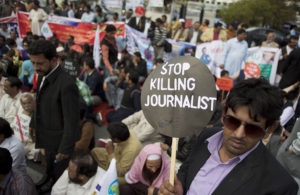 Attacks on journalists in the year 2018 varied from targeted killings to abductions and intimidation. Three reporters lost their lives in targeted attacks in Pakistan, according to the Paris-based INGO, Reporters Without Borders (RWB). Zeeshan Ashraf Butt, a Sialkot-based correspondent for the Urdu daily Nawa-i-Waqt and former chairperson of the Sambrial Press Club, was reportedly shot dead by the PML-N’s Imran Aslam Cheema, chairman of the Begowala Union Council, on March 27. The latter was angered by the questions the reporter was asking him regarding a new tax that had been imposed locally. Abid Hussain, a reporter for the Daily Sang-e-Meel, who had provided in-depth coverage of drug-trafficking in Punjab, succumbed to a fatal beating on August 23. Sohail Khan, a reporter for the K2 Times, another Urdu daily, was gunned down on October 16, after his exposé on the arrest of a drug dealer in Khyber Pakhtunkhwa (KP).
Attacks on journalists in the year 2018 varied from targeted killings to abductions and intimidation. Three reporters lost their lives in targeted attacks in Pakistan, according to the Paris-based INGO, Reporters Without Borders (RWB). Zeeshan Ashraf Butt, a Sialkot-based correspondent for the Urdu daily Nawa-i-Waqt and former chairperson of the Sambrial Press Club, was reportedly shot dead by the PML-N’s Imran Aslam Cheema, chairman of the Begowala Union Council, on March 27. The latter was angered by the questions the reporter was asking him regarding a new tax that had been imposed locally. Abid Hussain, a reporter for the Daily Sang-e-Meel, who had provided in-depth coverage of drug-trafficking in Punjab, succumbed to a fatal beating on August 23. Sohail Khan, a reporter for the K2 Times, another Urdu daily, was gunned down on October 16, after his exposé on the arrest of a drug dealer in Khyber Pakhtunkhwa (KP).
No surprise then that Pakistan scored 139th on the 2018 World Press Freedom Index and RWB has listed local extremist groups and intelligence agencies as “predators of press freedom.” However, targeted killings of media personnel, on the whole, have declined from 11 in 2011, to three in 2018, according to the Committee to Protect Journalists (CPJ). CPJ data indicates that the decline in the killings of journalists coincides with the launch of Operation Zarb-e-Azb. However, the CPJ has emphasised that despite the decline, military pressure on media houses has steadily increased over the last few years, ever since the drive against terrorism gained speed.
Taha Siddiqui, the Islamabad bureau chief of the Indian channel World Is One News and an outspoken critic of Pakistan’s military, was administered a beating by about a dozen armed assailants in what he described as a foiled abduction attempt by the law enforcement authorities in the capital on January 10. Meanwhile journalist and activist Gul Bukhari, another vocal critic of the military, was abducted for several hours on June 5, in Lahore. On July 13, Kadafi Zaman, an employee of TV 2, a Norwegian channel, was arrested and beaten while attending a PML-N rally in Gujarat. Charged with attempted murder, assault and interference in the duties of the administration, he was released on bail a few days later.
The Disappearing Act
The total number of reported cases of missing persons in the year 2018 amounted to 1,000, according to updated figures provided to Newsline in December 2018 by the Commission of Inquiry of Enforced Disappearances (the data includes persons who have gone missing in previous years, but were reported to the COIOED in 2018). Of these, 612 cases were disposed of in 2018. Cases are disposed after the missing person is traced down and their whereabouts are confirmed, according to COIOED officials. This includes a person who is found to be in an internment centre, imprisoned by authorities on grounds of treason and criminal charges, or is a victim of kidnapping.
Scamelot
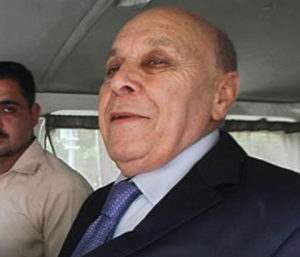 2018 may prove to be the year that marked the beginning of the end for Asif Ali Zardari and his minions. The year saw the beginning and
2018 may prove to be the year that marked the beginning of the end for Asif Ali Zardari and his minions. The year saw the beginning and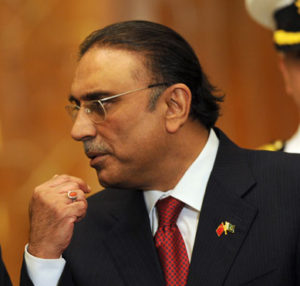 the end of an investigation into a mega money-laundering scam unearthed by the Federal Investigation Agency (FIA). The 128-page report submitted by the Joint Investigation Team (JIT) to the Supreme Court in December revealed that Rs 42.37 billion had been laundered through 32 fraudulent accounts. While Hussain Lawai (former chairman of Summit Bank), Bilal Sheikh (former director of Sindh Bank) and Anwar Majeed (Chairman of Omni Group) and his son were already in police custody on charges of facilitating the scheme, the report revealed that Zardari’s lawyer, Farooq Naek and his son were also among the beneficiaries. The Ministry of the Interior placed on the exit control list (ECL) the 172 suspects linked to the scam.
the end of an investigation into a mega money-laundering scam unearthed by the Federal Investigation Agency (FIA). The 128-page report submitted by the Joint Investigation Team (JIT) to the Supreme Court in December revealed that Rs 42.37 billion had been laundered through 32 fraudulent accounts. While Hussain Lawai (former chairman of Summit Bank), Bilal Sheikh (former director of Sindh Bank) and Anwar Majeed (Chairman of Omni Group) and his son were already in police custody on charges of facilitating the scheme, the report revealed that Zardari’s lawyer, Farooq Naek and his son were also among the beneficiaries. The Ministry of the Interior placed on the exit control list (ECL) the 172 suspects linked to the scam.
The gunpowder trail leads to Zardari and his sister Faryal Talpur, who, according to the report, exercised direct influence over NBP and Sindh Bank. The report accuses Zardari of misdeclaring assets in the nomination papers of the 2018 election, which could lead to a disqualification for lifetime from contesting elections if he is found guilty.
Owing to political interference by the Sindh government, the Majeeds were in and out of prison. In December, sources close to Majeed reported that law enforcement authorities found him at home, in Karachi, despite Supreme Court orders that he be hospitalised in Islamabad. The Sindh government had not shifted Majeed to Islamabad on the grounds that his delicate health did not allow for it. In the same month, the media reported that Abdul Ghani, after being produced in a Special Banking Court of Karachi for a hearing, was transferred to Malir District Prison instead of being sent back to Adiala Jail, prompting the Punjab government to issue a formal request that he be shifted back to Rawalpindi.
Blow Hot, Blow Cold
 US relations with the newly sworn-in federal government got off to a shaky start. First, the Trump administration announced that Pakistan’s military officers would, for the first time in decades, be excluded from the International Military Education and Training (IMET) programme held in the US. Then came the phone call. Foreign Minister Shah Mehmood Qureshi’s version of a phone conversation between him and Secretary of State, Mike Pompeo, was at odds with the version made public by the State Department.
US relations with the newly sworn-in federal government got off to a shaky start. First, the Trump administration announced that Pakistan’s military officers would, for the first time in decades, be excluded from the International Military Education and Training (IMET) programme held in the US. Then came the phone call. Foreign Minister Shah Mehmood Qureshi’s version of a phone conversation between him and Secretary of State, Mike Pompeo, was at odds with the version made public by the State Department.
Security aid to Pakistan was cut for the second time in a year, when the US announced in September that it would suspend $300 million in military support funds. Nevertheless, during his visit to Pakistan in the same month, Pompeo expressed a desire to “reset the relationship” with the new government, adding that the two countries would have to build trust by delivering on promises.
Foreign Minister Qureshi claimed to have had a fruitful discussion with President Trump on the sidelines of the UN General Assembly, on matters relating to the US-Pakistan relationship. That relationship hit a new low in November, when Trump tweeted what was, arguably, a sequel of sorts to his January tirade against Pakistan, sparking a Twitter war with Prime Minister Khan. In December, Pompeo placed Pakistan on an American watchlist of countries unable to safeguard religious freedoms and the beliefs of minorities. In the same month, Trump wrote a letter to Khan, asking for his help in the Afghan peace talks, to which the latter replied in the affirmative. And the first Pakistan-aided US-Taliban talks were held in the UAE on December 18, attended by officials from Pakistan, Saudi Arabia and the UAE.
Blasphemy Makes History
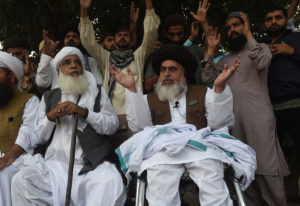 Aasia Bibi, a Christian woman sentenced to death on blasphemy charges in 2009, filed an appeal against her execution on October 8, 2018. A three-member bench of the Supreme Court accepted the appeal on October 30, and acquitted Aasia in a ruling viewed as a possible harbinger of a tolerant era in the country.
Aasia Bibi, a Christian woman sentenced to death on blasphemy charges in 2009, filed an appeal against her execution on October 8, 2018. A three-member bench of the Supreme Court accepted the appeal on October 30, and acquitted Aasia in a ruling viewed as a possible harbinger of a tolerant era in the country.
Aasia’s acquittal led to countrywide protests by religious right-wing groups led by the Tehreek-e-Labbaik Pakistan (TLP) and its fiery orator of a Chairman, Khadim Hussain Rizvi. The government reached a five-point agreement with Rizvi, the chief agitator, under which an appeal against the verdict would not be met with objection. Meanwhile, Aasia’s lawyer, Saiful Mulook, who says he will continue to fight her case in the courts after the TLP filed an appeal, was forced to flee the country for security reasons.
In the following month, however, the government struck back. Rizvi’s plans of staging another gathering to observe Martyr’s Day at the Faizabad interchange, was purportedly used as an excuse to arrest him and other senior leaders of the TLP, including Dr Asif Ashraf Jalali, Pir Afzal Qadri, Inayatul Haq Shah and Hafiz Farooqul Hassan. Charged with sedition, the accused, if convicted, could face life sentences. Approximately 3,164 party activists were taken into custody across the country by law enforcement authorities.
The Debutantes
 Members of the Kalash, Dalit and Kohli communities entered parliament for the first time in Pakistan. Wazirzada, a young Kalash resident of Chitral district’s Rumbur Valley and a PTI candidate, was elected to the Khyber Pakhtunkhwa Assembly on a minority seat in the July 25 general election. Wazirzada was well-known locally as a social worker. Similarly, Krishna Kumari Kohli of Tharparkar was the first female Dalit (‘Untouchable’) to become a member of Pakistan’s Senate, while Badin’s Tanzeela Qambrani, of Sheedi ethnicity (African descent), entered the Sindh Assembly on a reserved seat for women.
Members of the Kalash, Dalit and Kohli communities entered parliament for the first time in Pakistan. Wazirzada, a young Kalash resident of Chitral district’s Rumbur Valley and a PTI candidate, was elected to the Khyber Pakhtunkhwa Assembly on a minority seat in the July 25 general election. Wazirzada was well-known locally as a social worker. Similarly, Krishna Kumari Kohli of Tharparkar was the first female Dalit (‘Untouchable’) to become a member of Pakistan’s Senate, while Badin’s Tanzeela Qambrani, of Sheedi ethnicity (African descent), entered the Sindh Assembly on a reserved seat for women.
Jam the BAP-tist
The Balochistan Awami Party (BAP) came into existence on March 29, courtesy a contingent of Pakistan Muslim League Nawaz (PML-N) defectors, independent Senators and other influential politicians of Balochistan who had their eye on the forthcoming general election. A cloud of scepticism surrounded the BAP from the outset owing to its sudden appearance on the scene, and questions have been raised as to who is behind the party, which claims to prioritise provincial matters and the rights of the Baloch. With former PML-N stalwart Jam Kamal as its President, the BAP emerged as the largest party in the election to the Balochistan Assembly and Kamal was elected Chief Minister.
Passage to India
Pakistan and India agreed to open the Kartarpur Corridor, a thoroughfare that would enable the passage of Sikh pilgrims from India to the 16th century shrine of the founder of the 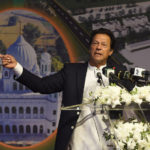 Sikh religion, Guru Nanak, located in Pakistan’s Narowal district. Under the agreement between Indian Prime Minister Narendra Modi and Pakistani PM Imran Khan, India will build the corridor from Dera Baba Nanak in Gurdaspur, till the Pakistan border. The corridor was officially opened by Khan on November 28 in a ceremony attended by Navjot Sidhu, the Indian Minister of Local Government, Tourism, Cultural Affairs and Museums.
Sikh religion, Guru Nanak, located in Pakistan’s Narowal district. Under the agreement between Indian Prime Minister Narendra Modi and Pakistani PM Imran Khan, India will build the corridor from Dera Baba Nanak in Gurdaspur, till the Pakistan border. The corridor was officially opened by Khan on November 28 in a ceremony attended by Navjot Sidhu, the Indian Minister of Local Government, Tourism, Cultural Affairs and Museums.
Big Trouble in Little China
The Chinese Consulate in Karachi’s posh locality of Clifton came under an attack from three armed militants on the morning of November 23. Armed with guns and grenades, the militants cruised into the heavily barricaded neighbourhood with relative ease. The attack claimed the lives of four victims – two policeman and two visa applicants – while the perpetrators were killed in a prolonged gun battle with the police outside the embassy, which is located in a predominantly residential area where a number of schools are also located. The police confirmed that all three attackers were residents of Balochistan and members of the Baloch Liberation Army (BLA).
A Party on Trial
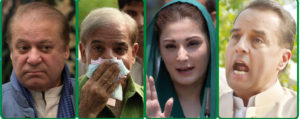 While 2018 brought with it some respite for the Sharifs, the family continued to be embroiled in legal entanglements. The anti-climactic soap opera that saw the handing down of prison sentences and their subsequent reversals, culminated in former prime minister Nawaz Sharif being handed seven years in the Al-Azizia Steel Mills corruption reference and fined Rs 1.5 billion and $25 million. Sharif was acquitted in the Flagship Investments reference.
While 2018 brought with it some respite for the Sharifs, the family continued to be embroiled in legal entanglements. The anti-climactic soap opera that saw the handing down of prison sentences and their subsequent reversals, culminated in former prime minister Nawaz Sharif being handed seven years in the Al-Azizia Steel Mills corruption reference and fined Rs 1.5 billion and $25 million. Sharif was acquitted in the Flagship Investments reference.
Earlier, the Islamabad High Court (IHC), on September 19, suspended the sentences handed down on July 6 by an anti-corruption court against former prime minister Nawaz Sharif, his daughter Maryam Nawaz and son-in-law Captain Safdar over properties the family allegedly owned in London. The sentences were suspended after the convicts filed petitions against the Avenfield verdict. The ruling was believed to have been passed on the grounds that the evidence against the accused was weak. The three were subsequently released from Adiala Jail on bail. And in December, the Supreme Court dismissed the NAB’s appeal to re-open the Hudabiya Paper Mills case against the Sharifs.
Meanwhile, Nawaz’s brother, Shehbaz Sharif, Leader of the Opposition in Parliament, was arrested by the National Accountability Bureau (NAB) in Lahore, on charges of causing a loss to the national exchequer in relation to the Ashiana-i-Iqbal Housing Scheme. However, in December, an accountability court ruled that the NAB had been unable to produce sufficient evidence against Sharif, who has been in custody since his arrest on October 5.
In December, the NAB also arrested PML-N leader Khawaja Saad Rafique and his brother, Salman Rafique, in a case involving the Paragon Housing Society scam after producing substantive evidence in court against the accused on December 11. How will 2019 play out for the Sharifs and the PML-N, given the present scenario?
Lost and Found
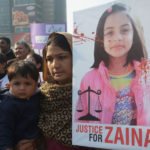 The strangled body of seven-year-old Zainab Amin, a resident of Kasur, surfaced at a garbage dump in January 9, almost a week after she was reportedly abducted from a tuition centre in her locality. The minor, who had been raped before being murdered, was the 12th victim of such an attack in Kasur in the preceding one-year. The incident occurred while the girl’s parents were away performing Umrah and she was in the custody of an aunt. Kasur erupted in riots amid widespread anger directed towards a police force perceived as having failed to deliver justice or ensure the safety of citizens. One of Zainab’s neighbours, Imran Ali, a prime suspect in the rape and murder, was arrested later that month, convicted in February and hanged in October.
The strangled body of seven-year-old Zainab Amin, a resident of Kasur, surfaced at a garbage dump in January 9, almost a week after she was reportedly abducted from a tuition centre in her locality. The minor, who had been raped before being murdered, was the 12th victim of such an attack in Kasur in the preceding one-year. The incident occurred while the girl’s parents were away performing Umrah and she was in the custody of an aunt. Kasur erupted in riots amid widespread anger directed towards a police force perceived as having failed to deliver justice or ensure the safety of citizens. One of Zainab’s neighbours, Imran Ali, a prime suspect in the rape and murder, was arrested later that month, convicted in February and hanged in October.
On the Last Few Rungs
According to the World Bank, in 2018 Pakistan maintained its position as one of the lowest performing countries in South Asia as far as human development indicators such as education, health and gender inequality are concerned. The report revealed that the country has one of the lowest female workforce participation rates in the region, the stunting of 45 per cent of children under the age of five; and that education, health and nutrition spending – currently constituting three per cent of the GDP – needed to be increased.
A New Low
 The Pakistani rupee plunged to a historic low against the US dollar – Rs 133.6 in October and Rs 143.3 in November, firming to Rs 139 by mid-December. The devaluation came at a time when Pakistan had finally made public its intention of approaching the IMF for a loan, after much dithering. Amid a balance of payment crisis and a widening current account deficit, the country’s foreign exchange reserves declined to $8.4 billion.
The Pakistani rupee plunged to a historic low against the US dollar – Rs 133.6 in October and Rs 143.3 in November, firming to Rs 139 by mid-December. The devaluation came at a time when Pakistan had finally made public its intention of approaching the IMF for a loan, after much dithering. Amid a balance of payment crisis and a widening current account deficit, the country’s foreign exchange reserves declined to $8.4 billion.
The depreciation of the rupee (aimed to boost exports), along with other steps taken by the government, such as the hike in gas tariffs and the planned hike in electricity tariffs, plus the increase in interest rates (to stop inflation), were inevitable measures in the given scenario and a bitter pill that the PTI government had to swallow.
Land of Smoke and Mirrors?
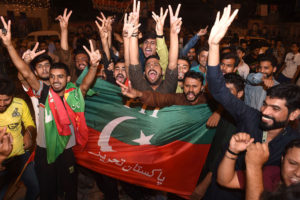 2018 will be remembered as the year in which Imran Khan’s career reached its pinnacle. It was the year his journey from being a cricketer and celebrity, to becoming prime minister elect – after a 22-year struggle – came full circle. The Pakistan Tehreek-i-Insaf emerged as the largest party in the country and formed the government at the centre. However, the PTI’s victory was followed by accusations of rigging and of the entire process being engineered by the military establishment.
2018 will be remembered as the year in which Imran Khan’s career reached its pinnacle. It was the year his journey from being a cricketer and celebrity, to becoming prime minister elect – after a 22-year struggle – came full circle. The Pakistan Tehreek-i-Insaf emerged as the largest party in the country and formed the government at the centre. However, the PTI’s victory was followed by accusations of rigging and of the entire process being engineered by the military establishment.
The opposition parties claimed that the law-enforcement authorities had a hand in installing the new governments at the federal and provincial levels. Election observers and polling agents present at various polling stations in Sindh, for instance, claimed that the final results were not a reflection of the voter turnout. There were demands for a recount and re-elections in certain constituencies.
The final report of the EU Election Observation Mission to Pakistan, published in October, stated that “a level playing field for parties or candidates is not assured,” and that “key beneficiaries of campaign spending, such as media houses, were subject only to ad hoc reporting requirements. This diminished transparency and is at odds with international standards.”
An estimated 200 lives were lost in the run-up to and during the elections, in attacks on corner meetings and polling stations. For the first time since 2002, national and provincial constituency boundaries were redrawn in a delimitation exercise conducted by the Election Commission of Pakistan, based on the provisional results of the 2017 Census. Voter turnout for the National Assembly elections was 52 per cent – three per cent lower than the 2013 elections – while the turnout for the provincial assembly elections was approximately 53 per cent.
The Year the Markets Crashed
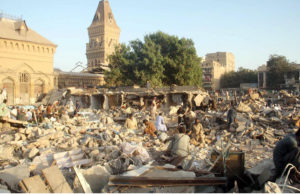 On November 5, bulldozers entered Karachi’s ‘Saddar Bazar’ and wiped out a large section of Empress Market, marking the start of the anti-encroachment drive in the city, conducted by the Karachi Municipal Corporation (KMC) on the orders of the Supreme Court. After demolishing approximately 1,500 shops in Saddar and making over 4,000 hawkers redundant, the drive, which lacked a relocation plan, turned to other parts of the city – including Arambagh, Lighthouse, Nazimabad, Malir and Gulshan-e-Iqbal in the same month, amid widespread criticism of the initiative.
On November 5, bulldozers entered Karachi’s ‘Saddar Bazar’ and wiped out a large section of Empress Market, marking the start of the anti-encroachment drive in the city, conducted by the Karachi Municipal Corporation (KMC) on the orders of the Supreme Court. After demolishing approximately 1,500 shops in Saddar and making over 4,000 hawkers redundant, the drive, which lacked a relocation plan, turned to other parts of the city – including Arambagh, Lighthouse, Nazimabad, Malir and Gulshan-e-Iqbal in the same month, amid widespread criticism of the initiative.
In December, the drive was extended to Karachi’s Gharibabad and Liaquatabad areas, to clear land allocated for the Karachi Circular Railway, of encroachments. Chief Justice Saqib Nisar stated that it was the job of the Sindh government to come up with a plan to relocate the
thousands in the city affected by the ongoing anti-encroachment drive.
Split Personality
 2018 saw a further split in the rank and file of the MQM, when an internal revolt against Farooq Sattar resulted in the division of the MQM-P into two factions
2018 saw a further split in the rank and file of the MQM, when an internal revolt against Farooq Sattar resulted in the division of the MQM-P into two factions – MQM-Bahadurabad (led by Khalid Maqbool Siddiqui) and MQM-PIB Colony (led by Farooq Sattar). The two nominated separate candidates for the Senate elections in March. In June, attempts were made at reconciliation between the two groups, but rifts continued to surface and embittered members of the PIB faction formed a workers action committee against the Bahadurabad group.
– MQM-Bahadurabad (led by Khalid Maqbool Siddiqui) and MQM-PIB Colony (led by Farooq Sattar). The two nominated separate candidates for the Senate elections in March. In June, attempts were made at reconciliation between the two groups, but rifts continued to surface and embittered members of the PIB faction formed a workers action committee against the Bahadurabad group.
In June, the Election Commission of Pakistan removed Farooq Sattar as convener of the MQM-P, and in November, the MQM-P’s coordination committee expelled Sattar from the party for repeatedly violating party discipline.
Meanwhile, another breakaway faction, the two-year-old Mustafa Kamal-led Pak Sarzameen Party (PSP), which attempted to provide the Urdu-speaking community of Sindh with a viable alternative to the MQM, fared poorly in its first-ever general election after it failed to secure even a single seat at the national and provincial levels.
The writer is a staffer at Newsline Magazine. His website is at: www.alibhutto.com


